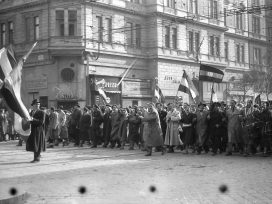Jörg Haider was on the brink of a political comeback when he died in a car accident in October. Throughout his career, Haider’s critics in Austria made a disastrous mistake, writes Robert Menasse. They suspected him of fascism, yet didn’t understand it correctly – and therefore couldn’t react adequately.
Articles
Read more than 6000 articles in 35 languages from over 90 cultural journals and associates.
In the West, manga has become a key part of the cultural accompaniment to economic globalization. No mere side-effect of Japan’s economic power, writes Jean-Marie Bouissou, manga is ideally suited to the cultural obsessions of the early twenty-first century.
While there are many differences between the Kundera case and those of other eastern European intellectuals revealed as having informed to the secret police, its disclosure has followed the usual pattern. It is important to evaluate each on an individual basis, cautions György Dalos.
Art interventions as alternative place-making
Urban cultural exchange between Vienna and Hong Kong
The creative city has become the buzzword on the agenda of many city governments, economic developers, and cultural planners since Charles Landry introduced this idea in his book “The Creative City: A Toolkit for Urban Innovators” in 2000.
A trace of metaphysics?
On the allegations against Milan Kundera
On 13 October, the Czech weekly “Respekt” released details of former police records appearing to prove that in 1950 Milan Kundera denounced a man suspected of spying. Since then, more details of the case have come to light that cast doubt upon Kundera’s involvement. Whatever the outcome, writes Samuel Abrahám, the manner in which the allegations have been made represents a failure of journalistic decency.
In 1997 the circle of right-wing intellectuals from the “Slovenian Spring”, for the most part associated with Nova Revija, signed an appeal called “The hour of European truth for Slovenia”, and considerably later, an initiative called “Something must be done”.
In a text first published in Varlik magazine in 1962, the great Turkish novelist, poet and politician Ahmet Hamdi Tanpinar (1901-1962) addresses what he saw as the demise of the Istanbul of his day. Despite its immediate social critical concerns, the text reflects the author’s existential pre-occupation with time and the unconscious.
In a text first published in Varlik in 1954, the Turkish writer Selahattin Batu sees westernization as both a destructive and progressive force. Striking is how such ambivalence continues in today’s discourse.
“You must create such an interesting national literature that the French will finally begin to feel they are missing something due to their lack of knowledge.” In an article published in 1966, the Turkish poet, journalist and critic Attila Ilhan argued that Turkish literature was far from having gained real recognition abroad. Is the situation different today?

“The eastern European ’68ers formed the backbone of the democratic opposition and dissidents, whereas we, the somewhat older ’56ers, only joined in with certain reservations, because we had a closer acquaintance with defeat.” The Hungarian writer György Konrád takes an ironic look at the ’68ers from the perspective of a participant in the Hungarian Revolution of 1956.
The Bronze Nights
The failure of forced Europeanization and the birth of nationalist defensive democracy in Estonia
Nationalist mobilization was responsible for the escalation of the crisis over the Bronze Soldier in Tallinn in April 2007, writes Tonis Saarts. The EU accession process over, Estonia’s dominantly rightwing party politics has found a new rallying cry: the threat of Russia.
In a speech delivered on the twentieth anniversary the Lithuanian national reform movement Sajudis, Romualdas Ozolas, one of its founding members, reviews the intellectual situation in Lithuania today. He argues that an ideologized empiricism, all too redolent of Marxism, has made a comeback. Instead, the European tradition of abstract thought as mastered by Kant must show the way in thinking about the State.
The playwright and essayist László Végel writes despairingly on Serbian politics as a member of the Hungarian minority in Vojvodina, northern Serbia. Despite vigorous campaigning in Vojvodina by Viktor Orbán (leader of Hungary’s centre-right Fidesz party), ethnic Hungarians in Serbia have been abandoning the minority parties and voting for the more liberal, Belgrade-based parties in Serbia. At the same time, they unconditionally support the Right in Hungary itself.
Contact and friendship with the publishers of European cultural journals has helped Samuel Abrahám, founding editor of “Kritika&Kontext”, realize his goal of publishing a liberal journal in post-socialist Slovakia.
Writer and journalist George Blecher’s first European meeting of Cultural journals was in Berlin in 1989. He has been coming back ever since – despite his being neither an editor nor a European.
Olivier Corpet was present at the European meetings of cultural journals from the very start. Writing in 1986, the founding editor of “La Revue des Revues” reported on a movement that was steadily gaining momentum.